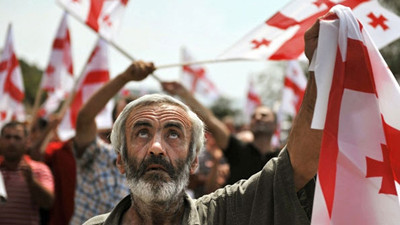格魯吉亞的歷史
Bad location
糟糕的位置
Despite its unhappy history and dire geography, Georgia is doing well
雖然歷史坎坷,位置糟糕,格魯吉亞現在做得不錯
Edge of Empires: A History of Georgia. By Donald Rayfield.
《帝國的邊緣:格魯吉亞的歷史》。作者:Donald Rayfield。
Georgia: A Political History since Independence.
《格魯吉亞:自獨立開始的政治歷史》。作者:Stephen Jones。
TO MOST outsiders Georgian history is a closed book. Indeed for English-speakers there are practically no books at all. Georgia mostly features on the edges of other peoples' histories. Xenophon, describing Greek mercenaries' attempts to get home in 400BC, wrote the first description of it. Books about the Soviet Union highlight Georgia's role as a rebellious captive and as the birthplace of Josef Stalin, its most infamous son. A flurry of recent accounts describe the brief, disastrous war with Russia in 2008. Now Donald Rayfield of the University of London and Stephen Jones of Mount Holyoke College in Massachusetts have written ambitious and comprehensive histories of a complex country.
大多數非格魯吉亞人對格魯吉亞的歷史一無所知。實際上基本沒有一本關于格魯吉亞歷史的書籍是用英語寫的。大多數情況下,格魯吉亞只能在別國歷史的邊邊角角里看到。公元前400年,描述希臘雇傭兵為回家而努力的色諾芬第一次提到了格魯吉亞。關于蘇聯的史書將格魯吉亞要么視為叛逆的俘虜,要么視為其最罪名昭著的國民約瑟夫·斯大林的誕生地。最近出版的一系列書描述了格魯吉亞與俄羅斯在2008年展開的那場災難性的短暫戰爭。現在,倫敦大學的Donald Rayfield和馬薩諸塞州曼荷蓮女子學院的Stephen Jones為讀者描繪出這個復雜的國家恢弘而又全面的歷史。

The authors are among a handful of foreigners to have mastered Georgian. Part of the small and ancient Kartvelian language family, it is related to no others, though some have fancifully claimed a distant cousinhood with Basque. Its roots are as obscure as the origins of those who speak it. Mr Rayfield starts around 1100BC, with the first mention in an Assyrian source of the “Mushki”. The first Georgian king, Parnavaz, was born in 326BC.
這兩名作者是少數幾個掌握格魯吉亞語的外國人。盡管有些人異想天開地宣稱格魯吉亞語和巴斯克語許久之前同系一源,但其實格魯吉亞語是卡特維利語族的一個古老的小分支,和其他語言都不相關。格魯吉亞語的起源和格魯吉亞人的起源一樣湮滅在歷史的塵埃中。Rayfield從公元前1100年左右開始寫起,亞敘的史書在那時第一次提到“Mushki”。第一個格魯吉亞國王Parnavaz誕生于公元前326年。
The scope of Georgian history may be a humbling shock for those who thought the country appeared on the map only when the Soviet Union collapsed in 1991. But the reader needs to take a deep breath, for the next 200 pages could be mistaken at times for a stray appendix from J.R.R. Tolkien's “The Lord of the Rings”. The tersely told stories involve hundreds of unknown but like-sounding people and places which appear and disappear in quick succession. The beheadings, castrations, sodomisations, rapes and eye-gougings—a local speciality—that dot the pages are jolting. But a little more in the way of analogies, signposts, interpretation and characterisation would have lightened the mixture.
對于那些認為格魯吉亞在1991年蘇聯解體時才出現在地圖上的人來說,格魯吉亞歷史的源遠流長可能是個令人羞愧的發現。但是讀者需要深呼吸一下,因為之后的200頁有時候會被人誤以為是J.R.R.托爾金所著的《指環王》丟失的附錄。一個個用詞簡練的故事里有著成百上千個不知名卻聽起來都很像的人物和地點,這些名字快速地出現,又快速地消失。在這部分,不時出現的砍頭、閹割、雞奸、強奸和挖眼情節讓人看得觸目驚心。如果多點類比、線索、解釋和特征描述將會使這部分讀起來不那么沉重。
The most cheerful pages concern Georgia's golden age—around 1212 at the height of Queen Tamar's reign. The country has never since been bigger, stronger or safer, stretching 800 miles (1,288km) from what is now Trabzon in Turkey to the shores of the Caspian sea. Georgia's fortunes depend on the weakness or goodwill of its much larger neighbours: Russia to the north, Persia to the south-east, Turkey to the west. Mr Rayfield's powerful theme is of brief periods of prosperity and security, ended by invasion, conquest, looting and despoliation. Georgians have had to get used to rule by outsiders: they often outwit them. Kremlin rule began with mass murder and ruinous economic planning, but in later decades Georgia was one of the most prosperous and enjoyable places to live in the Soviet Union. It was a similar story in the 19th century under Russian imperial rule.
在該書中,讀起來最讓人心情愉快的部分與格魯吉亞的黃金時代有關—格魯吉亞的黃金時代在1212年左右塔瑪皇后執政時期達到頂峰。那時的格魯吉亞的疆域最大、國力最強、局勢最穩。其疆域綿延800英里(1288公里),從現在位于土耳其的特拉布宗一直到里海的海岸。只有在那些比格魯吉亞大得多的鄰國處于衰弱時期,或者對格魯吉亞態度友好時,格魯吉亞才得以繁榮。這些鄰國有北部的俄羅斯,東南部的波斯以及西部的土耳其。在Rayfield宏大的著作中,格魯吉亞每次短暫的繁榮和穩定后都是列強的侵略和肆意搶劫。格魯吉亞人不得不習慣于被外國人統治:但他們常常比統治者更聰明。蘇聯占領格魯吉亞初期展開大屠殺和毀滅性的計劃經濟,但在隨后的幾十年里格魯吉亞是蘇聯最繁榮最適宜居住的地方。19世紀格魯吉亞被俄國君王統治時也是相似的情形。
Georgia's rulers' own penchant for internal divisions and double-dealing has played a big role in prompting the country's many disasters. So too has the failure of faraway outside powers to reciprocate Georgia's pro-Western sentiments. The story of the years 1918-21, when the Georgian Democratic Republic made repeated vain appeals to Britain and other Western powers, before the Bolsheviks invaded, make poignant reading. They echo previous episodes involving Georgian rulers' entreaties to the Byzantine empire and Venice—and foretell, perhaps, the let-down that many Georgians felt when nobody came to their aid in 2008.
格魯吉亞的許多災難都是因為該國統治者喜歡內部斗爭和耍兩面派造成的。遙遠的外部力量沒能回應格魯吉亞親西方的感情也是因為這些統治者。1918至1921年間,格魯吉亞民主共和黨一次又一次向英國和其他西方列強求助無果,最后被布爾什維克侵略,這個故事讀起來讓人辛酸。這與該書之前講到的格魯吉亞統治者向拜占庭帝王和威尼斯求助的故事驚人地相似。這個故事也許還預示著2008年因為無人幫忙許多格魯吉亞人會品嘗到失望。
Mr Jones deals at book-length with the years covered by Mr Rayfield's final chapter. Georgia's disastrous rebirth, amid economic collapse and civil war, gave way to a period of sleazy stagnation under Eduard Shevardnadze, who had run the place in Soviet times and then served as Mikhail Gorbachev's foreign minister.
Jones的書涵蓋的年份和Rayfield的書中最后一章相同。先是格魯吉亞在經濟崩潰和內戰后充滿災難的重生,隨后就是Eduard Shevardnadze領導下的經濟停滯。Eduard Shevardnadze在蘇聯時期管理格魯吉亞,后來成為米哈伊爾·戈爾巴喬夫執政時期蘇聯的外交部長。
Amid much useful detail, Mr Jones snipes at the record of Mikheil Saakashvili, who became president after the “Rose Revolution” of 2003. His party narrowly lost the parliamentary election this year. To the surprise of those who saw Putinesque tendencies in his camp's authoritarian approach, Mr Saakashvili's party has calmly conceded defeat.
Jones的書提供了很多有用的細節。其中的一個是米哈伊爾·薩卡什維利的執政履歷。薩卡什維利在2003年的“玫瑰革命”后成為總統。他所在的政黨在今年的議會選舉中惜敗。然而令那些認為該黨獨裁的統治方式越來越接近普京時,薩卡什維利所在的政黨平靜地承認了失敗。
That came too late for either book, which is a pity because it would offset many of Mr Jones's criticisms of Georgia's failure to meet his perhaps rather unrealistic standards of “virtuous” democracy. Much of the country outside the capital, Tbilisi, is still dreadfully poor; institutions are imperfect; government pressure on the media and judiciary can be heavy-handed or even nastier. But for a place that was a failed state only 20 years ago the progress is startling, especially given the near- constant pressure, subversion and denigration from Russia.
可惜他的競選失利對于這兩本書而言都來地太晚了。如果這發生地再早些,就能推翻Jones對格魯吉亞沒能達到他可能相當不實際的“高尚”民主標準的許多批評。首都第比利斯以外的許多地區仍然極度貧困;各類機構問題百出;政府對媒體和司法的壓力很大,有時甚至會采用下流的手段。但對于一個20年前還被認為是“失敗國家”的地方來說,特別是考慮到該國幾乎一直受到俄羅斯的壓迫、暗中破壞和抹黑,其進步還是非常驚人的。
Mr Jones skates over the problems caused by Russia and underplays the real achievements of the Saakashvili years. These include bringing the country closer to the West, eliminating petty corruption, for example in the customs service and the traffic police, modernising public services, attracting foreign investment and establishing an open if rough-hewn political system. Georgia is now a country where the opposition has a real chance of winning power, and all sides abide by the constitution. Readers of Mr Rayfield's book may feel that in the past 2,500 years Georgians have seldom had so much to be happy about.
Jones一筆帶過俄羅斯給格魯吉亞造成的問題,輕描淡寫薩卡什維利執政時期取得的成就。這些成就包括使該國與西方關系更緊密,消滅了諸如在海關和交警的基層腐敗,使公共服務現代化,吸引外商投資,并創建了一個開放的、可能還不健全的政治體系。格魯吉亞的反對黨有可能贏得政權,而且所有各方都遵守憲法。Rayfield的讀者們可能覺得在過去的2500年,格魯吉亞人民從沒有像現在一樣有這么多值得高興的事。












